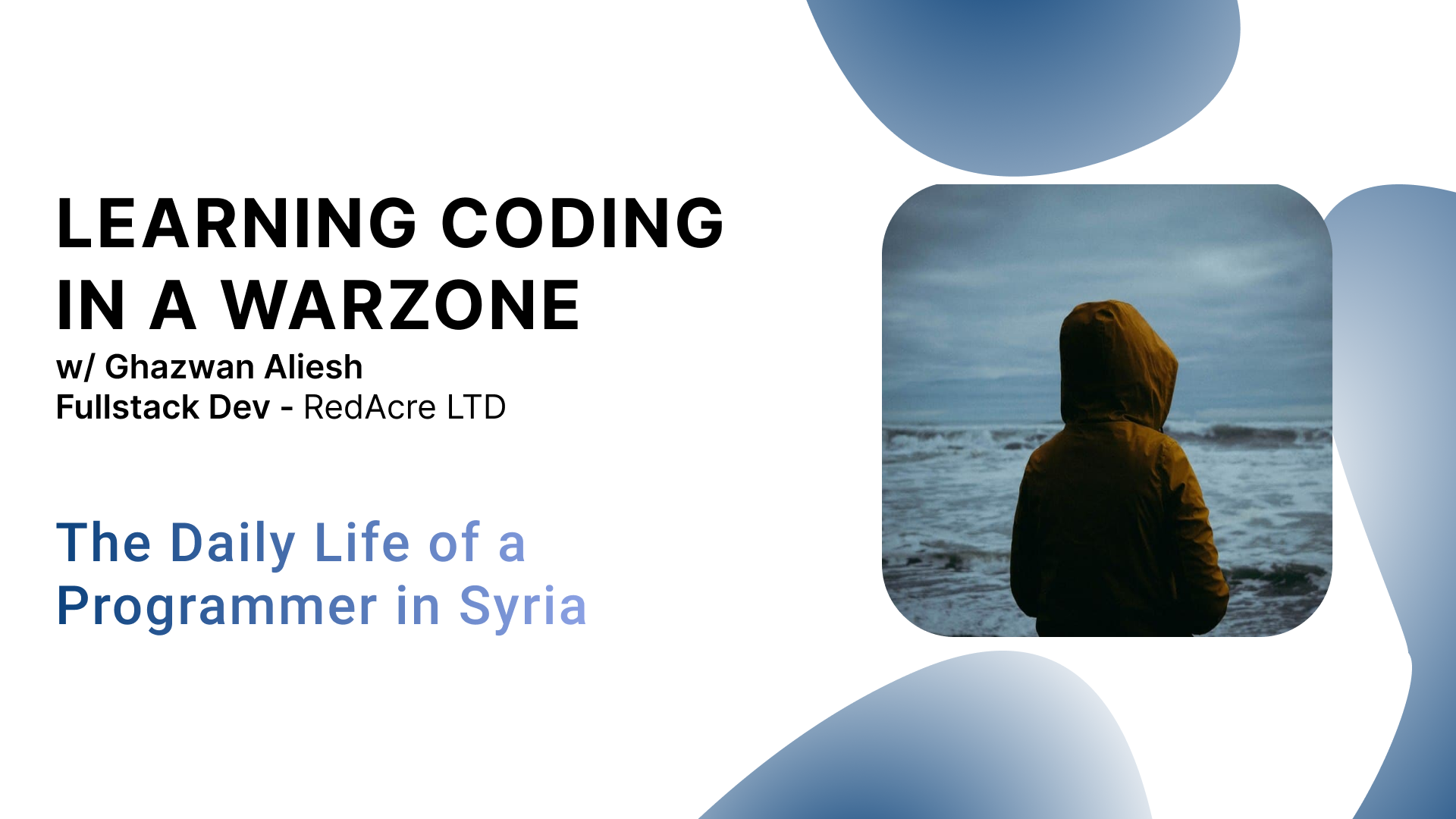The Life of a Programmer in Syria
How Ghazwan learned programming in the backdrop of a war, and how it helped him in achieving a better life for himself.

At first glance, Ghazwan Aliesh’s life followed a similar path to many: he went to university first to become a doctor, decided it wasn’t for him, and so switched to software engineering. His first job out of university didn’t pay well, so he sought remote opportunities to continue to work and develop his skills.
What this brief overview is missing is that Ghazwan is Syrian and did all of this during the decade-long conflict in his country. While in university he experienced classes being cancelled due to bombings or power outages that left him without internet to do his work. Ghazwan had to eventually flee Syria for safety concerns and is now working for a European company while living in Lebanon.
Ghazwan’s story is one of perseverance, determination, and a commitment to bettering himself through learning and knowledge. And while his challenges may have been unique to him, they are lessons to all of us who want to grow our skillset and achieve certain goals, whether to learn programming or elsewhere.
Ghazwan’s Story in Syria
As described, Ghazwan learned to be a programmer and started working in that profession during the current crisis in Syria. In his words, things were pretty good—economically speaking—before 2011. The Arab Spring happened that year, which was a revolution of people who were ready for change.
What started as a revolution became a full-out civil war as the government regime tried to subdue the “rebels.” This conflict has now been ongoing for over 10 years, leading to economic and social devastation. Many people have died and many more live in poverty, unable to buy even a bag or rice (due to inflation, it might cost up to $100!).
It is against this backdrop that Ghazwan started on his path to learn programming. He studied it in school, but due to the problems of a university in a warzone, he had to supplement his learning at home. He was able to get a job in programming, but the pay was “criminally low” and not a good working environment.
From there, he set his sights on working remotely for a company in Europe. After many, many rejections, he was connected with a company in Ireland who wanted to take a chance on him, despite his lack of experience. This totally changed Ghazwan’s life, as they offered him a salary at $15/hour, or $2,000/month. Ghazwan shared that he and his family could hardly believe it.
“It was unimaginable for me. I know Syrians who work their life and never get $2000.”
Ghazwan continued to work for this company and was able to develop and grow his skills to a point of becoming a senior developer. He shared how he fit the stereotype:
“... stereotype that programmers have no life… I was like that. I was learning 24 hours a day.”
How to Learn Programming in a Warzone
Ghazwan was first exposed to coding in the second grade. As he shared,
“we had dial-up internet then. I downloaded my first book about the language PHP. It was intriguing to me that you could click a button and do something. It was very close to magic for me.”
And the love for coding only grew, especially as he learned what kind of opportunities would open up to work remotely and earn more income than he could in Syria.
To learn programming did not come without challenges! Living in a warzone, Ghazwan had to overcome a number of challenges to learn skills and start working as a programmer. Here are some of the problems he experienced:
- No laptop computer. Ghazwan’s family couldn’t afford a computer, so he learned how to code first on a mobile phone. After his mother received $100 from work, he was able to finally buy a computer, which changed his ability to learn and code.
- Lack of internet. There were times when internet was not available, so he would have to go to a café to download what he needed.
- Electricity blackouts. Without constant electricity, it was difficult to work. Ghazwan purchased car batteries and converters to power his laptop when the electricity was down.
- Safety concerns. They government regime is suspicious of anyone who works for a western company, so Ghazwan needed to keep his job secret. He did so by using a VPN to hide his online location in order to keep it from the authorities.
- Inability to be paid. Again, because the government regime in Syria is suspicious of money coming in, Ghazwan could not just accept a money transfer from Western Union to be paid for his work. Instead, he was paid by bitcoin and had to find someone who could transfer it into Syrian currency in order to use.
Lessons for Programmers
Most programmers will not face the exact same problems as Ghazwan. But, we will all have to overcome some challenges in life and in our careers. Ghazwan’s story can teach us a lot about determination to overcome challenges and seek out a better life. Ghazwan was motivated by the opportunities that programming could offer him, so kept pushing through all the difficulties.
Ghazwan has some advice for new programmers:
- Invest in equipment and internet so that you can be productive and learn as much as possible.
- Keep learning, no matter what. Ghazwan recommends setting aside four hours a day to learn when you are just starting. In his early coding days, Ghazwan did a lot of research online about how to code and tips from other coders. He credits one Quora forum to the start of his success.
Someone had asked the question, “what is the best coding language.” The answer was to find out what is used locally in the market you want to work for, and start there. So, Ghazwan was able to research and pick up C# as his first marketable coding language. - Target countries outside of your home country. Programming opens up a ton of opportunities to work remotely and work for companies in countries that pay higher.
- Believe in yourself, stay consistent and never give up.
Conclusion
Ghazwan’s story is so inspiring. It inspires us to be better programmers and better people as we overcome the different challenges put in front of us. He shows us what kind of opportunities are possible when you are committed to learning and growing.
We’re super grateful to have had Ghazwan on the show! If you want to learn more about him, feel free to connect with him over at @ghazwan_him. You can also connect with us on Twitter @thewritingdev to learn more about uplifting and exciting devs-related news and initiatives.
If you want to watch the complete episode, check out the YouTube link below
